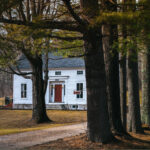- What makes Vermont a desirable place to live? Vermont is known for its picturesque landscapes, vibrant communities, and a strong sense of community. The state offers a high quality of life, with outdoor recreational opportunities, a low crime rate, and a focus on sustainability.
- What is the housing market like in Vermont? The housing market in Vermont varies, but overall, it is characterized by a mix of historic homes, charming cottages, and modern properties. Prices will vary based on location, with more rural areas often having more affordable options and access to larger lot sizes. It is not uncommon for rural towns to have 5 or 10 acre minimums.
- What are the best areas to consider for homebuyers? Popular areas include Burlington for its cultural scene, Montpelier for its small-town charm (it’s the only state capitol without a McDonald’s fast food restaurant), and areas near ski resorts like Stowe, Killington, or Jay Peak for winter enthusiasts. Consider your lifestyle preferences when choosing a location.
- How is the job market in Vermont? Vermont’s job market is diverse, with opportunities in healthcare, education, technology, and agriculture. Remote work options have expanded due to the emergence of high-speed internet options in rural areas, making it easier for professionals to live in Vermont while working for companies outside the state.
- What about education for families with children? Vermont is known for its excellent education system. There are quality public schools, and the state has a strong commitment to education. Additionally, there are numerous renowned colleges and universities for those pursuing higher education.
- How does the weather in Vermont impact daily life? Vermont experiences four distinct seasons, some locals will even add a 5th season apply named Mud Season. Winters can be cold with ample snowfall, making it a haven for winter sports. Summers are mild with sufficient sun and rain for gardening, and fall showcases stunning foliage. Residents often adapt by engaging in seasonal activities like skiing, hiking, and maple sugaring.
- Are there any unique considerations for rural living in Vermont? Rural living is a defining feature of Vermont. While it offers tranquility and natural beauty, it’s essential to consider factors like longer commutes and limited access to certain amenities. However, the sense of community in rural areas is often strong and sustainable agriculture is thriving.
- What is the cost of living in Vermont? The cost of living can vary, but overall, Vermont tends to be on par with the national average. It’s important to consider factors like property taxes and heating costs, which can be influenced by the state’s colder climate.
- Is Vermont a tax-friendly state? Vermont has a progressive income tax system. While property taxes can be a consideration, there are various exemptions and programs to help mitigate the overall tax burden.
- Any advice for those moving to Vermont from out of state? Embrace the local culture, connect with the community, and explore the natural beauty. Vermonters are known for their friendliness, so don’t hesitate to reach out and make connections. Additionally, be prepared for the unique experiences each season brings.
Vermont has its own special charm, and the transition can be smooth with proper planning and a willingness to embrace the Vermont way of life.

